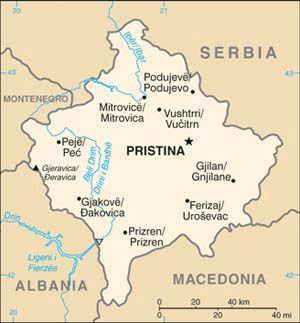Kosovo Finalises Amendments For Supervision End
By SETimes
By Linda Karadaku
Kosovo’s parliament approved a package of changes to the country’s constitution on Friday (August 31st) after the amendments were finalised by the Commission for constitutional amendments.
The changes, which the 120 seat parliament passed with 63 votes in favour, provide the framework for the official end of supervision in the country.
Kosovo proclaimed its independence in 2008, based on a plan by UN envoy Marti Ahtisaari, which provided for a supervised independence for the new country. Serbia did not and has not accepted the independence of its former province.

The head of the commission, Arsim Bajrami, told SETimes that the changes include 22 laws based on 50 amendments.
“The legal package includes amended laws which were related to the presence and the competencies of the international civilian representative,” Bajrami said.
These competencies mostly cover the appointment of the senior officials in Kosovo from the international civilian representative.
“Based on the proposals of the government and the amendments made by the commission, the competencies of the international civilian representative will be transferred to the institutions of the Republic of Kosovo, in a balanced way,” Bajrami told SETimes.
The amendments do not touch the status of NATO-led KFOR, and do not deal with the future presence of EULEX.
“Regarding KFOR, the constitutional and legal changes made in the framework of the closure of the international supervision of the independence, do not change the status of the international military presence, because this has been regulated with an international resolution. Regarding EULEX, it has been invited from the country’s institutions to operate in Kosovo and by now, the institutions of the Republic of Kosovo, including the Presidency and the Parliament, are working to ensure EULEX presence until 2014,” Bajrami said.
Serbian analyst Dragan Popovic, executive director of Belgrade-based Policy Centre, believes that both KFOR and EULEX will have an important role in the future in Kosovo.
“Through KFOR, NATO is present in Kosovo, which is absolutely necessary for this part of the world. From our past, it is clear that there is no peace in the Balkans without NATO … These arguments for both EULEX and KFOR to stay in Kosovo are also very important for local Serbs, who still do not want to be alone with the Pristina government. Strong international presence can play an important role in the future step-by-step integration of the Serbs into Kosovo society,” Popovic told SETimes.
The EULEX mission on the other hand, is an opportunity for the EU to show a capability in solving open issues in Europe and to deal with post-conflict or conflict situations, he said. “[The] EU needs to preserve a reasonable presence in Kosovo, and EULEX is a good tool for such a thing.”
In Kosovo, the Kipred Institute warned on August 9th that Kosovo’s real problems will remain after the end of international supervision, such as internal division and limited international legitimacy.
“The northern part remains de-facto divided, a situation which risks undermining all the successes in the south. The state security and the fight against corruption and organized crime will continue to rely on bodies whose mandates derive from the 1999 UN Security Council Resolution 1244, KFOR and EULEX respectively,” it said.
Kipred also noted that “these international missions and their eventual fate will be decided upon the changes to the Resolution 1244, which depend on Russia, whose eventual decisions depend on Serbia’s will and its position towards Kosovo.”
“The lessons learned from Serbia’s position on and ventures against Kosovo during latest technical dialogue, however, do not leave much room for such hopes to materialise,” it said.
Kosovo Prime Minister Hashim Thaci told his cabinet this week that the country should work harder to fulfill the democratic reforms, which are necessary for NATO and EU membership.
“Full independence also means full responsibility,” Thaci said, adding that the maturity and the politic and civic consensus unity were decisive to have a successful closure of this process [of the international supervision of independence].
